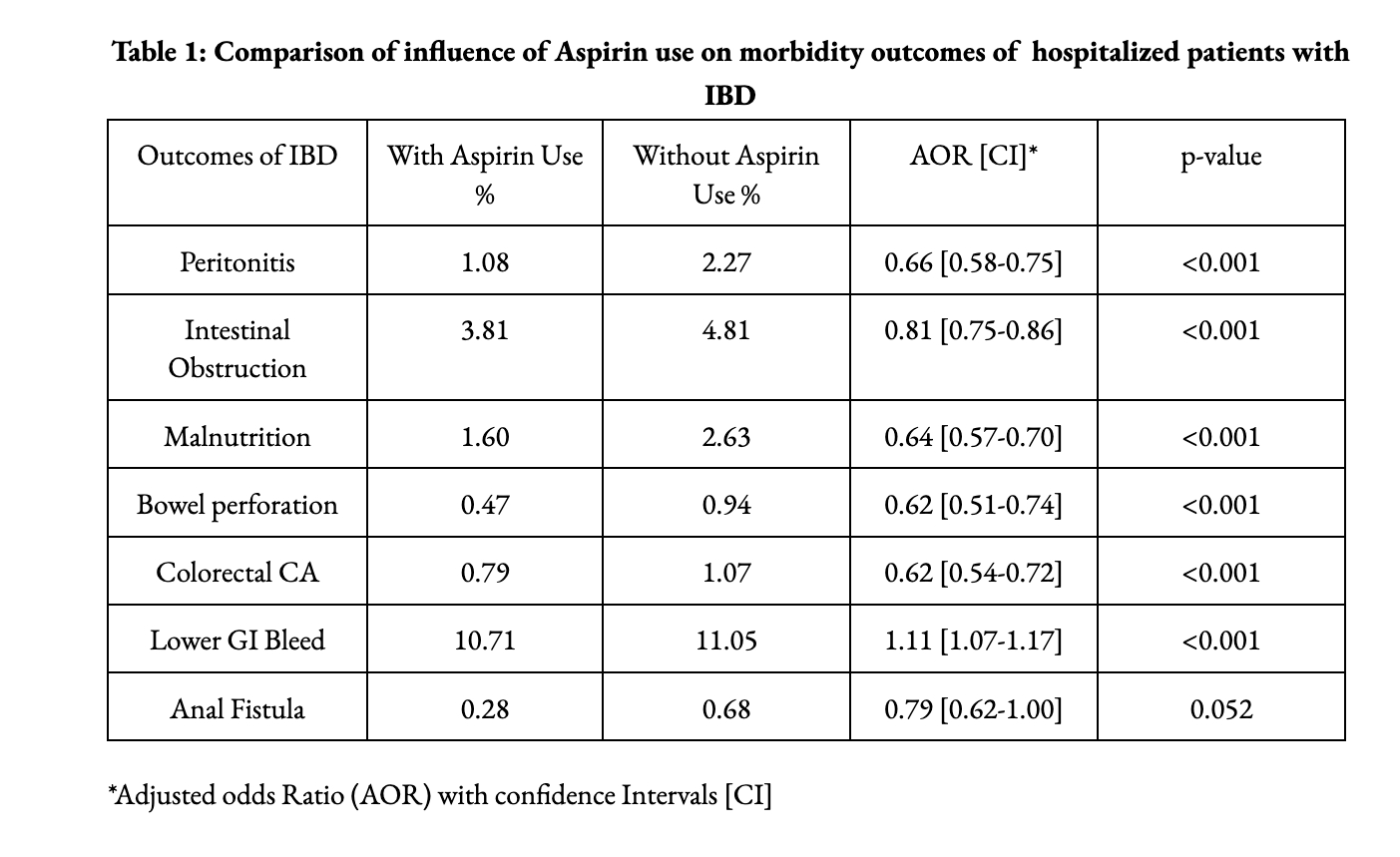Sunday Poster Session
Category: Biliary/Pancreas
P0089 - Association Between Malnutrition and Adverse Outcomes in Acute Pancreatitis: A National Perspective
Sunday, October 26, 2025
3:30 PM - 7:00 PM PDT
Location: Exhibit Hall

Sweta Lohani, MD (she/her/hers)
Brooklyn Hospital Center
Brooklyn, NY
Presenting Author(s)
Sweta Lohani, MD1, Anuj Sharma, MD1, Chaula Desai, MD1, Aashutosh Sah, MD2, Iyad Al-Bustami, MD, MPH1, Manasa Ginjupalli, MD1, Jose Orsini, MD1
1Brooklyn Hospital Center, Brooklyn, NY; 2MacNeal Hospital Loyola Medicine, Berwyn, IL
Introduction: Nutritional management plays an important role in several medical conditions and is known to be a strong predictor of in-hospital outcomes. Acute pancreatitis is associated with a hypermetabolic state and high nutritional requirements. The current literature lacks sufficient information on the relationship between malnutrition and acute pancreatitis. Our study aims to explore this relationship further and study the impact of malnutrition on outcomes of acute pancreatitis.
Methods: The National Inpatient Sample (NIS) database from the years 2016 to 2020 was queried to identify adult hospitalizations with acute pancreatitis; determined using ICD-10 codes. The hospitalizations were categorized into two groups based on the presence or absence of malnutrition. Demographic and clinical data were analyzed using chi-squared tests and independent sample t-tests. Logistic regression models were used to adjust for potential confounders. Statistical significance was determined by a p-value of 0.05 or less.
Results: 2,201,599 adult hospitalizations with acute pancreatitis were identified, out of which 8.9% had malnutrition and 91.1% without malnutrition. Patients with malnutrition were younger (mean age 53 vs 57). Coexisting malnutrition in pancreatitis patients was associated with higher mortality (adjusted Odds ratio [aOR] 2.8, < 0.001). The malnutrition cohort was also associated with significantly higher odds of complications like chronic pancreatitis (aOR 1.68, p-value < 0.001), pancreatic pseudocyst (aOR 3.43, p-value < 0.001), biliary obstruction (aOR 2.14, p< 0.001), and pancreatic cancer (aOR 2.67, p< 0.001). Rates of systemic complications were also higher in the malnourished cohort, like acute kidney injury (AKI; aOR 2.4, p< 0.001), and sepsis (OR 3.48, p< 0.001).
Discussion: This study highlights the direct impact of malnutrition on outcomes in acute pancreatitis, specifically resulting in increased mortality and morbidity. These findings underscore the importance of early nutritional interventions during and following the acute phase of pancreatitis. Timely nutritional management could reduce hospital length of stay, enhance prognosis, lower complication rates, and shift care toward greater cost-effectiveness, ultimately improving quality of life for this vulnerable patient population.

Figure: Outcomes of acute pancreatitis with and without malnutrition
Disclosures:
Sweta Lohani indicated no relevant financial relationships.
Anuj Sharma indicated no relevant financial relationships.
Chaula Desai indicated no relevant financial relationships.
Aashutosh Sah indicated no relevant financial relationships.
Iyad Al-Bustami indicated no relevant financial relationships.
Manasa Ginjupalli indicated no relevant financial relationships.
Jose Orsini indicated no relevant financial relationships.
Sweta Lohani, MD1, Anuj Sharma, MD1, Chaula Desai, MD1, Aashutosh Sah, MD2, Iyad Al-Bustami, MD, MPH1, Manasa Ginjupalli, MD1, Jose Orsini, MD1. P0089 - Association Between Malnutrition and Adverse Outcomes in Acute Pancreatitis: A National Perspective, ACG 2025 Annual Scientific Meeting Abstracts. Phoenix, AZ: American College of Gastroenterology.
1Brooklyn Hospital Center, Brooklyn, NY; 2MacNeal Hospital Loyola Medicine, Berwyn, IL
Introduction: Nutritional management plays an important role in several medical conditions and is known to be a strong predictor of in-hospital outcomes. Acute pancreatitis is associated with a hypermetabolic state and high nutritional requirements. The current literature lacks sufficient information on the relationship between malnutrition and acute pancreatitis. Our study aims to explore this relationship further and study the impact of malnutrition on outcomes of acute pancreatitis.
Methods: The National Inpatient Sample (NIS) database from the years 2016 to 2020 was queried to identify adult hospitalizations with acute pancreatitis; determined using ICD-10 codes. The hospitalizations were categorized into two groups based on the presence or absence of malnutrition. Demographic and clinical data were analyzed using chi-squared tests and independent sample t-tests. Logistic regression models were used to adjust for potential confounders. Statistical significance was determined by a p-value of 0.05 or less.
Results: 2,201,599 adult hospitalizations with acute pancreatitis were identified, out of which 8.9% had malnutrition and 91.1% without malnutrition. Patients with malnutrition were younger (mean age 53 vs 57). Coexisting malnutrition in pancreatitis patients was associated with higher mortality (adjusted Odds ratio [aOR] 2.8, < 0.001). The malnutrition cohort was also associated with significantly higher odds of complications like chronic pancreatitis (aOR 1.68, p-value < 0.001), pancreatic pseudocyst (aOR 3.43, p-value < 0.001), biliary obstruction (aOR 2.14, p< 0.001), and pancreatic cancer (aOR 2.67, p< 0.001). Rates of systemic complications were also higher in the malnourished cohort, like acute kidney injury (AKI; aOR 2.4, p< 0.001), and sepsis (OR 3.48, p< 0.001).
Discussion: This study highlights the direct impact of malnutrition on outcomes in acute pancreatitis, specifically resulting in increased mortality and morbidity. These findings underscore the importance of early nutritional interventions during and following the acute phase of pancreatitis. Timely nutritional management could reduce hospital length of stay, enhance prognosis, lower complication rates, and shift care toward greater cost-effectiveness, ultimately improving quality of life for this vulnerable patient population.

Figure: Outcomes of acute pancreatitis with and without malnutrition
Disclosures:
Sweta Lohani indicated no relevant financial relationships.
Anuj Sharma indicated no relevant financial relationships.
Chaula Desai indicated no relevant financial relationships.
Aashutosh Sah indicated no relevant financial relationships.
Iyad Al-Bustami indicated no relevant financial relationships.
Manasa Ginjupalli indicated no relevant financial relationships.
Jose Orsini indicated no relevant financial relationships.
Sweta Lohani, MD1, Anuj Sharma, MD1, Chaula Desai, MD1, Aashutosh Sah, MD2, Iyad Al-Bustami, MD, MPH1, Manasa Ginjupalli, MD1, Jose Orsini, MD1. P0089 - Association Between Malnutrition and Adverse Outcomes in Acute Pancreatitis: A National Perspective, ACG 2025 Annual Scientific Meeting Abstracts. Phoenix, AZ: American College of Gastroenterology.
